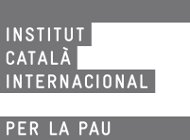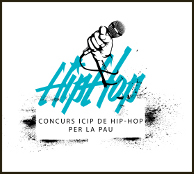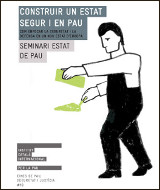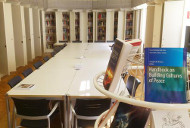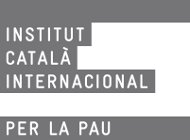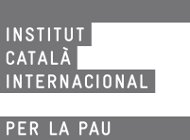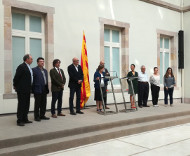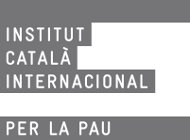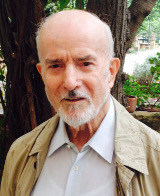The Norwegian Nobel Committee awarded the Nobel Peace Prize for 2016 to the President of Colombia, Juan Manuel Santos, for his efforts to reach a peace agreement with the FARC guerrillas that will bring to an end more than fifty years of armed conflict.
The International Catalan Institute for Peace (ICIP) welcomes the decision of the Nobel Committee to recognize the work of the Colombian president for the sake of peace, an award that also aims to encourage all the actors in Colombia to continue working for peace, after the rejection of the peace accords in the October 2 referendum.
So we at ICIP hope that this recognition will help relaunch peace negotiations and lead to an agreement that satisfies the majority of Colombians.
It should also be pointed out that the peace agreement in Colombia is the result of four years of negotiations in Havana between the Colombian government and the FARC guerrillas. Therefore both actors, as well as numerous Colombian civil society organizations, have been crucial to achieving a peaceful solution after decades of armed violence.
Author: whads
ICIP announces First Hip-Hop for Peace Contest
To mark Make Music Day, which takes place on June 21, ICIP announces the first edition of the ICIP Hip-Hop for Peace Contest with the aim of encouraging creativity and giving visibility to the commitment of young people in the field of peace.
The competition has two categories. The first one is open to students in secondary school, vocational training school and senior high school in Catalonia; the second category is open to young people between the ages of 12 and 25 who participate in youth, cultural, civic or social-educational action centers or organizations in Catalonia. In both cases, participating groups must have at least three members.
To participate, groups must compose a hip-hop piece with original rhymes and make a video recording of its performance lasting no more than four minutes. The lyrics of the songs must be related to the celebration of diversity; coexistence in urban areas or schools; criticism of violence; the denunciation of human rights violations; solidarity with people who are trapped by, or fleeing, armed conflict; or the role of youth in peacebuilding.
The deadline for submitting videos is Monday, November 28, 2016. For more information, see the contest rules and entry form attached below.
The First ICIP Hip-Hop for Peace Contest is being organized in conjunction with the Department of Education and the Directorate-General for Youth of the Generalitat of Catalonia.
“Building a safe and peaceful state”, State of Peace Seminar
Building a Safe and Peaceful State: How to Approach Security and Defense in a New European State is a contribution to the social dialogue on state security and defense. It argues that both existing states and newly created ones, such as Catalonia could become in the future, should deal with conflict from a non-military perspective and forsake armed defense as a pillar of security.
For three years a group of people from various Catalan groups and organizations working in the field of peace have shared thoughts and ideas until they came up with common formulations for the concepts discussed. The State of Peace Seminar, heir to the Pau i Treva group, was created in September 2012 to meet the demands of Catalan social movements dealing with a pro-sovereignty process that intends to be radical in its approach but deeply pacific and democratic in manner.
The book has been published by ICIP as part of the “Tools of Peace, Security and Justice” digital series and is available in PDF and ePub formats.
The ICIP Library resumes its habitual opening hours
The ICIP Library resumed its habitual opening hours on Sept 1st, after the summer holidays. The premises are open from 9 am to 6:30 pm Monday to Thursday and from 9 am to 2 pm on Fridays
The ICIP Library, located at Tapineria, 10, 1st floor, in Barcelona, is specialized in peace culture, security and conflict issues. Its aim is to support and promote research in these fields, and it has become a reference center in its field in Catalonia. The library offers support to ICIP and to researchers and experts in the field of peace, and is in permanent contact with similar institutions and centers around the world. It is part of the network of specialized libraries of the Generalitat and has been included in the Collective Catalog of Universities of Catalonia (CCUC) since May.
This link will lead you to the library catalog.
The Catalan Parliament elects five new members to renew the ICIP Board of Governors
The Parliament plenary session elected five new members for the ICIP Board of Governors last May 5th, thus complying with the second phase of renewal of the major organ of management of the Institute, which was on hold since 2014. The chamber elected Cécile Barbeito, Carme Colomina, Vicent Martínez Guzmán, Xavier Masllorens and Oscar Mateos, as the Board’s five new members, in substitution for Alfons Banda, Rafael Grasa, Àngels Mataró, Mònica Sabata and Josep Maria Terricabras.
The ICIP Board of Governors, as established by article 6 of ICIP Law 14/2007, is integrated by ten members: seven appointed by Parliament and three designated by the Government. These five new members will constitute the new Board of Governors together with Carme Garcia, Eulàlia Pascual and Manel Vila (designated by Government) and Magda Oranich and Antoni Pigrau (elected by Parliament in November 2013, on the first phase of renewal of the Board).
The current vicepresident, Antoni Pigrau, will assume the presidency of the Institute until the Board appoints a new president, in substitution of Rafael Grasa.
ICIP celebrates resolution in favor of banning nuclear weapons
On 27 October, the United Nations General Assembly adopted a resolution in favor of opening negotiations to draw up a treaty banning nuclear weapons. The text was approved by a vote of 123 to 38 with 16 abstentions.
It is certainly a very significant step since the resolution recognizes the humanitarian impact of nuclear weapons and the risk they pose to civilian populations. The international community has sufficient evidence on the long-lasting irreversible effects of nuclear weapons, and numerous civil society organizations, working together on the International Campaign to Abolish Nuclear Weapons, have fought for decades to achieve the abolition of such weapons. Nevertheless, the number of countries that have nuclear weapons has gone up from five to eight in recent years, and the world’s most industrialized countries, including the United States, Russia, the United Kingdom, Canada, Japan and most members of the European Union voted against this resolution.
A long road lies ahead and it will not be free of obstacles; the United Nations will be holding the first negotiation conferences in 2017 with the objective of having a “legally binding instrument to ban nuclear weapons and to move towards their total elimination.” ICIP welcomes the result of the last vote and we hope that the road that lies ahead is a road of no return.
Towards a Colombia at peace
The International Catalan Institute for Peace (ICIP) reaffirms its commitment to peace in Colombia the day after a referendum in which voters rejected the peace agreement signed between the government of Juan Manuel Santos and the FARC guerrilla movement. ICIP believes that we must continue working to make peacebuilding possible and leave behind over fifty years of armed violence and eight million victims. But we are also aware that achieving peace is a long process, and not without obstacles.
It is this commitment to peace that led ICIP, along with other Catalan institutions and organizations, to celebrate the formal signing of the peace deal with numerous festive, educational and institutional events last week. A Colombian delegation, consisting of Lucía González, advisor to the High Commissioner for Peace in Colombia, and Henry Acosta, Colombian economist and facilitator of the agreement between the Colombian government and the FARC during the four years of negotiations in Havana, participated in the celebrations. The Colombian delegation was received by the President of Parliament, Carme Forcadell, the Minister of Foreign Affairs, Institutional Relations and Transparency, Raül Romeva, and the Mayor of Barcelona, Ada Colau.
The peace agreement celebrations were organized by ICIP, the Catalan Agency for Development Cooperation, the City of Barcelona, Casa Amèrica Catalunya, the Barcelona Provincial Council, the Catalan Development Cooperation Fund, the Taula Catalana Coordination Group for Peace and Human Rights in Colombia, Colòmbia en Pau, and Colombia Soy Yo.
Open call for nominations for the ICIP Peace in Progress Award 2016
The International Catalan Institute for Peace (ICIP) has convened the 6th edition of the ICIP Peace in Progress Award, which corresponds to year 2016, with the aim to reward and publicly recognize individuals, organizations or institutions that have made a significant contribution toward promoting and fostering peace.
The deadline for submitting nominations is Monday July 25th. You can find more information on the ICIP Award Criteria and Nomination Form.
The ICIP Peace in Progress Award is granted by agreement of the Governing Board of ICIP and consists of public recognition, a sculpture created by the Nobel Peace Prize winner, artist and activist Adolfo Pérez Esquivel, called Porta del Sol, and a financial prize of 4,000 euros. The award is presented at an institutional award ceremony which takes place annually at the Catalan Parliament.
Previously granted
The ICIP Peace in Progress Award originated in 2011, with an extraordinary edition of the award honoring the Parliament of Catalonia for representing the continuity and legacy of the institutions “Pau i Treva” and “Consolat de Mar.” That same year, the first regular edition of the award recognized the struggle of conscientious objectors and “insubmisos” (people who refuse to do military service or any substitute social work) represented by Pepe Beunza, the first conscientious objector to compulsory military service for ideological reasons in Spain.
Then, in 2012, the ICIP Award was granted to five Madres de Soacha (Mothers of Soacha) for their work in favor of peace and human rights in Colombia. With this award, ICIP wanted to recognize their courage and perseverance in pursuit of truth, justice, and reparations for the killings of their children by the State security forces, and other cases of extrajudicial executions known as false positives.
In 2013, the ICIP Peace in Progress Award was granted to the ex-general born in Belgrade, Jovan Divjak, for his courage in the defense of Sarajevo during the Balkans War and his work in favor of the victims of that conflict.
In 2014, honored the Women’s International League for Peace and Freedom (WILPF) for its century-long involvement in the work of women for peace, as well as its commitment to disarmament, the defense of human rights and the persistence to obtain the recognition of the role of women in the building of peace.
Last edition of the award, in 2015, was granted to the Capuchin friar Joan Botam, promoter of numerous initiatives linked to peace and ecumenism.
Public statement of support for the Peace Process in Colombia
The International Catalan Institute for Peace (ICIP) has signed the statement of various Catalan civil society actors and institutions in support of the peace process in Colombia, which calls for a quick implementation of the Peace Accord signed by the Colombian government and the FARC guerrilla group and the establishment of a formal negotiating table between the government and the ELN guerilla group. The statement expresses the commitment of Catalonia with a lasting and sustainable peace in Colombia, which prioritizes the victims and is respectful of human rights and social justice.
PUBLIC ANNOUNCEMENT
In late September, Catalonia celebrated the signing of the Final Peace Agreement between the Government of Colombia and the Revolutionary Armed Forces of Colombia (FARC-EP). Catalan institutions and civil society celebrated the signing of this agreement, which put an end to more than fifty years of war, with various institutional and festive events.
Two months later the situation in Colombia remains delicate: a new agreement has just been ratified by Congress. We in Catalonia welcome this new agreement and urge that it be implemented immediately to ensure the continuity of the peace process and a definitive ceasefire. We also point out the importance of maintaining the focus on gender and the ethnic chapter in the agreement.
Similarly, we ask that a negotiating table – which had been announced for 27 October – be set up between the Colombian Government and the National Liberation Army (ELN). We encourage the parties to quickly reach an agreement that will lead to a comprehensive peace.
We are also concerned about the high-risk situation faced by social and trade union leaders, as well as human rights defenders and the communities most affected by the conflict. In recent days, five peasant leaders and members of the Patriotic March Movement have been killed and seven more have suffered attacks on their lives. Two of the leaders killed were members of peasant associations accompanied by Catalan organizations.
We stress the need to ensure the protection of social and political activists and human rights defenders. Only this year there have been at least 70 murders, 279 threats and 28 attacks against social leaders and human rights defenders, perpetrated mostly by paramilitary groups. It is of the utmost importance that the measures to dismantle paramilitary structures provided for in the Final Agreement be implemented, and that the National Commission on Security Guarantees become operational.
We in Catalonia reiterate the commitment of institutions and social organizations to accompany the implementation of the peace agreement and to continue working to build a lasting and sustainable peace in Colombia, prioritizing the victims and respectful of human rights and social justice.
ACCIÓ PER UNA CIUTADANIA SOLIDÀRIA -ACCISOL-
AMBDRETS
BRIGADES INTERNACIONALS DE PAU -PBI- CATALUNYA
CASA AMÈRICA CATALUNYA
CENTRE PER LA DEFENSA DELS DRETS HUMANS IRÍDIA
CIEMEN
COLECTIVO MALOKA
COLÒMBIA EN PAU
COLOMBIA SOY YO
DIRECCIÓ DE JUSTÍCIA GLOBAL I COOPERACIÓ INTERNACIONAL DE L’AJUNTAMENT DE BARCELONA
DONES X DONES
FEDERACIÓ D’ASSOCIACIONS DE VEÏNS I VEÏNES DE BARCELONA -FAVB-
FERRAN PEDRET – PORTAVEU ADJUNT DEL GRUP PARLAMENTARI SOCIALISTA DEL PARLAMENT DE CATALUNYA
FORO INTERNACIONAL DE VÍCTIMAS BARCELONA
FUNDACIÓN INDERA
FUNDACIÓ MÓN-3
FUNDACIÓN MUNDU BAT
GERARDO PISARELLO – PRIMER TINENT D’ALCALDIA I RESPONSABLE DE L’ÀREA DE RELACIONS INTERNACIONALS DE L’AJUNTAMENT DE BARCELONA
INSTITUT CATALÀ INTERNACIONAL PER LA PAU -ICIP-
INSTITUT DE DRETS HUMANS DE CATALUNYA -IDHC-
INTERNACIONAL ACTION FOR PEACE -IAP-
JORDI SENDRA – PORTAVEU DEL GRUP PARLAMENTARI DE JUNTS PEL SÍ A LA COMISSIÓ D’ACCIÓ EXTERIOR I COOPERACIÓ, RELACIONS INSTITUCIONAL I TRANSPARÈNCIA DEL PARLAMENT DE CATALUNYA
OBSERVATORIO POR LA AUTONOMÍA Y LOS DERECHOS DE LOS PUEBLOS INDÍGENAS EN COLOMBIA
PAZ A LA CALLE BARCELONA
PLATAFORMA UNITÀRIA CONTRA LES VIOLÈNCIES DE GÈNERE
RAFAEL GRASA – PROFESSOR DE RELACIONS INTERNACIONALS DE LA UNIVERSITAT AUTÒNOMA DE BARCELONA -UAB-
TAULA CATALANA PER LA PAU I ELS DRETS HUMANS A COLÒMBIA formada per:
AJUNTAMENT DE LLEIDA
ASSOCIACIÓ CATALANA PER LA PAU
COMISSIÓ CATALANA D’AJUDA AL REFUGIAT
CONSELL NACIONAL DE LA JOVENTUT DE CATALUNYA
COOPERACCIÓ
COOP DC
ENTREPOBLES
FONS CATALÀ DE COOPERACIÓ AL DESENVOLUPAMENT
FUNDACIÓ PAGESOS SOLIDARIS
FUNDACIÓ PAU I SOLIDARITAT – CCOO CATALUNYA
FUNDIPAU
INTERSINDICAL-CSC
JUSTÍCIA I PAU
LAFEDE.CAT – ORGANITZACIONS PER A LA JUSTÍCIA GLOBAL
LLIGA DELS DRETS DELS POBLES
MOVIMENT PER LA PAU – MPDL
OXFAM INTERMÓN
SINDICALISTES SOLIDARIS – UGT CATALUNYA
Joan Botam, 2015 ICIP Award
Catalan priest and Capuchin friar Joan Botam received the 2015 ICIP Peace in Progress Award at a ceremony that took place at the Parliament of Catalonia on April 12. Botam is a promoter of numerous initiatives linked to peace and ecumenism; he is one of the most important figures who introduced pacifism to Catalonia and a strong advocate of religion as a source of peace and dialogue.
Joan Botam (Les Borges Blanques, 1926) holds a doctorate in theology and is the founder of both the Víctor Seix Polemology Institute and the Ecumenical Center of Catalonia, of which he is currently president. His career linked to the pacifist movement begins in 1955, when he becomes chaplain of the religious movement Pax Christi. In 1963 he is elected vicar provincial of the Capuchins of Sarrià and, as such, he plays a key role in the events of the Caputxinada, the sit-in of students, intellectuals and artists in the Capuchin Convent in 1966. His intervention as vicar provincial was decisive in preventing the arrest of the demonstrators. More recently, Joan Botam represented Barcelona in the United Nations Millennium Summit of religious and spiritual leaders (2000) and was presented with the Creu de Sant Jordi Award (2010) for his contribution to interreligious dialogue and the promotion of peace, coexistence and understanding between cultures.
WILPF, 2014 ICIP Award
The 2014 ICIP Peace in Progress Award honors the Women’s International League for Peace and Freedom (WILPF) “for its century-long involvement in the work of women for peace, as well as its commitment to disarmament, the defense of human rights and the persistence to obtain the recognition of the role of women in the building of peace.”
WILPF, which turns 100 years old this year, was a pioneer in the creation of an internationalist pacifist feminism and is a model for all initiatives of women for peace. WILPF’s founding objectives were –and still are—”to bring together women of different political views and philosophical and religious backgrounds determined to study and make known the causes of war and work for a permanent peace.” Currently WILPF is headquartered in Geneva and New York and is present in 30 countries.
The award ceremony took place on Tuesday, February 24, at the Parliament of Catalonia. The event was attended by WILPF president, Adilia Caravaca
The ICIP Peace in Progress Award is an annual award consisting of a public recognition, a sculpture created by the Nobel Peace Prize winner, artist and activist Adolfo Pérez Esquivel, called the Porta del Sol, and an economic endowment of .4,000.
Joan Botam, 2015 ICIP Award
The Board of Governors of the International Catalan Institute for Peace (ICIP), meeting in Barcelona, has decided to present the 2015 Peace in Progress Award to the Catalan priest and Capuchin friar Joan Botam i Casals, promoter of numerous initiatives linked to peace and ecumenism. Botam is one of the most important figures who introduced pacifism to Catalonia and a strong advocate of religion as a source of peace and dialogue.
Joan Botam (Les Borges Blanques, 1926) holds a doctorate in theology and is the founder of both the Víctor Seix Polemology Institute and the Ecumenical Center of Catalonia, of which he is currently president. His career linked to the pacifist movement begins in 1955, when he becomes chaplain of the religious movement Pax Christi. In 1963 he is elected vicar provincial of the Capuchins of Sarrià and, as such, he plays a key role in the events of the Caputxinada, the sit-in of students, intellectuals and artists in the Capuchin Convent in 1966. His intervention as vicar provincial was decisive in preventing the arrest of the demonstrators.
More recently, Joan Botam represented Barcelona in the United Nations Millennium Summit of religious and spiritual leaders (2000) and was presented with the Creu de Sant Jordi Award (2010) for his contribution to interreligious dialogue and the promotion of peace, coexistence and understanding between cultures.
Previous recipients of the ICIP Award
The ICIP Peace in Progress Award originated in 2011, with an extraordinary edition of the award honoring the Parliament of Catalonia for representing the continuity and legacy of the institutions “Pau i Treva” and “Consolat de Mar.” That same year, the first regular edition of the award recognized the struggle of conscientious objectors and “insubmisos” (people who refuse to do military service or any substitute social work) represented by Pepe Beunza, the first conscientious objector to compulsory military service for ideological reasons in Spain.
Then, in 2012, the ICIP Award was granted to five Madres de Soacha (Mothers of Soacha) for their work in favor of peace and human rights in Colombia. With this award, ICIP wanted to recognize their courage and perseverance in pursuit of truth, justice, and reparations for the killings of their children by the State security forces, and other cases of extrajudicial executions known as false positives.
In 2013, the ICIP Peace in Progress Award was granted to the ex-general born in Belgrade, Jovan Divjak, for his courage in the defense of Sarajevo during the Balkans War and his work in favor of the victims of that conflict.
Finally, in 2014, the award was granted to Women International League for Peace and Freedom (WILPF) for its century-long involvement in the work of women for peace, as well as its commitment to disarmament, the defense of human rights and the persistence to obtain the recognition of the role of women in the building of peace.

